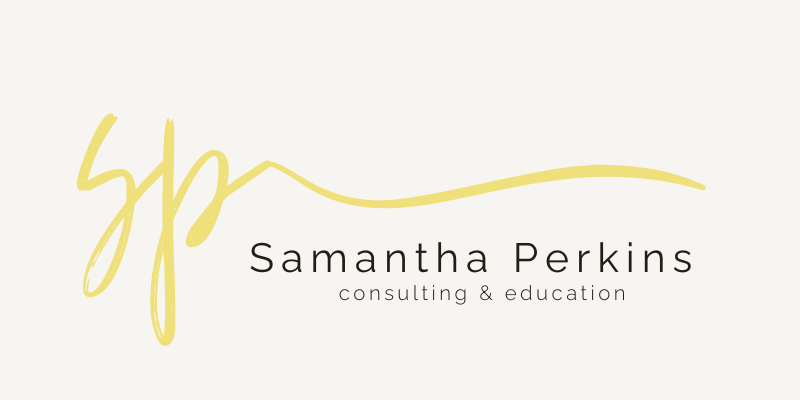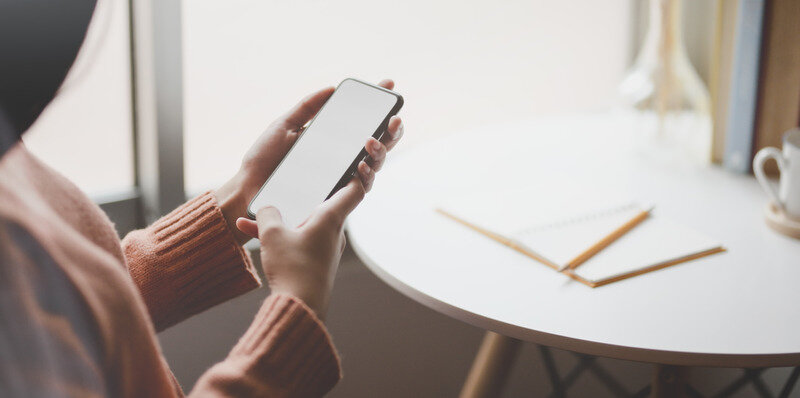Take Control Of Your Social Media Addiction
As I write this, my 6-year-old daughter is looking at a little compact mirror that holds a brush pretending that she got “103 views” on the fake video she just “posted” to her compact mirror that she is using as a phone. This is extremely ironic since I watched The Social Dilemma yesterday and spent most of last night awake feeling highly concerned for our world. This behavior likely came from a combination of watching me stare at my phone (humiliating to actually write that) and a show that she watches (ahem…used to watch because I plan to ban it from her viewing) where the girl character talks about her social media accounts.
In 2013, my daughter had just turned one and I was settling into my new role as a stay at home mom. I was pretty isolated and only had the company of my two, mostly non-verbal, bald-headed babies. I spent my days changing diapers, sweeping up cheerios, putting toys back in bins, and staring at Facebook. Since I no longer had any ongoing real social interaction I turned to Facebook as a way to see what was up with my friends, family, and the world at large.
It wasn’t long until my anxiety grew, I thought the world was the absolute worst place to live in, and I had guilt about bringing two small children into this mess of a place. According to Facebook, there was a giant divide among politics (so big that it was obvious there would be no settling or no solutions), a divide among humanity (only made up of those who were good and those who were evil), and millions of reasons to feel worried, scared, depressed, agitated, anxious, and basically bad all of the time. Since Facebook was my only outlet to the world, I believed the things I read to be true. And since Facebook was my only social interaction (around the time of an election) I believed most things were bad. Really bad.
That’s when I can pinpoint a change in my drinking. I remember drinking because I felt stressed instead of drinking because I was looking for a good time. After a day spent on Facebook, I needed a drink due to the exhaustion of taking in so many different posts. Posts about politics that concerned me, posts about people’s jobs I didn’t have, posts about new haircuts I wish I had gotten, posts about dinners I wanted to be invited to, posts about vacations that I didn’t go on, and so much more. It was the beginning of a very dark time.
Fast forward three years later to the time a pandemic hit our country. Again, nowhere to go and nothing to do and I found myself not only on Facebook but also on various social media apps. I mean more is always better right? News, stories, articles, opinions, posts, likes, follows, stress, anxiety, anger, and if you’ve been reading this for any amount of time…a breakdown.
I quit social media and I felt 75% better within days. I didn’t have to read conspiracy theories, I didn’t have to question the source, I didn’t have to be faced with angry people and their opinions on things that they have no experience with. It was so freeing. It’s not that I needed to go back to the doctor and reconsider my medication, I needed to get off the screen and back to my life.
Over the last three years, I have learned a lot about addiction. Most of us think of addiction in terms of drug use. But people can be addicted to anything. In fact, addiction starts as a way to make us feel better. We engage in something, it feels really really good at the moment, so our brains tell our bodies to go back for more. Over time this can become impulsive and problematic. Most of us go back for more without even realizing that we’re doing it. That’s what makes it dangerous. It happens beneath the surface and behind the scenes.
Social media is addictive. It’s designed to be that way by professionals who know how our brains work. The scroll, the autofill, the millions of little ways that it draws you in are not by accident but by a deliberate attempt to pull you back to your screen. You see, the more time you spend, the more you are being advertised to, and therefore the more money is made for the big corporations that are paying for this “free tool” that we all have.
I am a constant target for alcohol ads. I use the word beer, wine, alcohol, and drinking a lot in my social media feeds and posts. Because of this, if I’m on social media I’m seeing tons of ads for wine, beer, and alcohol companies. The algorithms are pretty smart for picking up the word “alcohol” but they haven’t quite figured out how the word “free” fits into everything. This is a constant reminder for me that I am being targeted.
We have all experienced a time when we looked up something on google and the next thing we know it shows up in social feeds as an advertisement. In fact, many people might say that they just thought of something and it showed up in your feed. If you watch The Social Dilemma, you’ll learn that it also deliberate because the technology is designed to learn everything about us.
Ok, so what? Who cares if I ended up buying something that I was thinking about buying anyway right? What’s the big deal? Well, it’s not just that we’re being marketed to. There is lots of evidence to show that depression, anxiety, and mental illness are on the rise since social media came onto the scene (especially among teenagers). And who hasn’t been emotionally affected when you see that all of their friends had dinner together last night and you weren’t invited or when your great Aunt Rosie posts something in direct opposition to what you firmly believe to be true? Who has felt worse or scared after reading an article about a kidnapping, a murder, or climate change?
It’s likely that if you’re one of the thousands of people in the world who drink alcohol, you may have decided to have a drink after a day spent reading exhausting social media articles. Social Media equals stress, we drink when we’re stressed, and things can go lots of different (not good) ways from there.
Many of us think that we are protected from addiction. It won’t happen to us. We think we are not genetically exposed. We don’t have family members who suffer from addiction. We think we have control. We think we can outsmart it. Maybe some of us can. I am not one of those people. I am not someone who knows how to stop the release of feel-good chemicals when I see pleasing pictures or eat sugar. Our brains are far more capable than our thoughts.
With everything going on in the world right now, it might be a good idea to learn about how and why our body responds to certain stimuli. It might be a good time to assess how much time you’re actually spending on social media and how it is really affecting your health. For example, I thought I was spending a couple of hours a day but it turned out it was far more than that.
Start a journal or a feelings chart. Mark or think about how you’re feeling before you get on and how you feel when you get off. What goal do you want to accomplish when you get on your accounts? Did you mean to do something work-related or did you mean to spend an hour mindlessly scrolling and ignoring your kids? Was there something specific you were looking for? Did you drink afterward? Take a class to learn about how it’s affecting you. Watch the movie. Get in the know. Being informed doesn’t mean you have to quit altogether, it just means that you have some awareness around your use.
Sobriety, for me, means never turning away from the truth. The truth frequently sucks. There’s work and it’s tiring but not nearly as tiring as continually doing something that makes me feel guilty and anxious.

